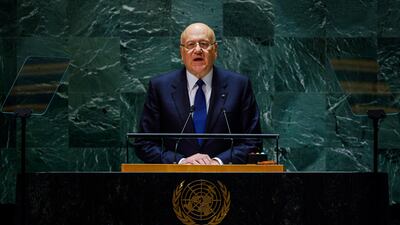Lebanon is struggling to cope with the numbers of refugees from Syria's civil war and the crisis will have consequences far beyond its borders, caretaker Prime Minister Najib Mikati told the UN General Assembly.
He called for a road map to a sustainable solution for the Syrian crisis before “its repercussions spiral out of control”.
“The negative repercussions of the Syrian displacement are deepening Lebanon’s crises, but Lebanon will not be the only victim,” Mr Mikati said at the 78th annual session of the General Assembly in New York on Wednesday.
“The international community's response to this tragedy remains timid, falling short of an effective and sustainable solution.”
Lebanon hosts about 805,000 registered Syrian refugees, but the actual number living in the country is believed to be higher since it stopped registering new arrivals in 2015.
Mr Mikati said “Lebanon's very existence” was threatened by “the burden of successive waves of displacement”.
He attributed Lebanon's economic crisis, which erupted in 2019 after decades of corruption and mismanagement, to “frequent conflicts within its borders and with neighbouring countries, as well as wars of aggression”.
This culminated in a “prolonged occupation of part of its territories and two protracted refugee and displacement crises”, he said, referring to the past spells of Syrian and Israeli control over Lebanese territory, as well as the influx of Palestinian refugees following the creation of Israel in 1948.
Mr Mikati also addressed Lebanon's failure to elect a president for almost a year, which he said had led to “the exacerbation of the economic and financial crisis and the failure to launch the reforms and financial recovery plans on which the Lebanese depend to save the country”.
Lebanon has been without a president for 10 months and Mr Mikati's government has been functioning in a caretaker capacity since the general election in May last year.
The country has been unable to access international financial support because its politicians were unable to enact the reforms needed even before former president Michel Aoun's term expired at the end of October last year.
Mr Mikati expressed appreciation for the efforts of the Group of Five – France, Egypt, Qatar, Saudi Arabia and the US – and the “French initiative” to expedite the election of a president by parliament.
He also denounced Israel's “continued occupation of parts of our land in the south and its continuing aggression and violation of the Lebanese sovereignty”.
Tensions have escalated in recent months along the southern border with Israel, where the UN Interim Force in Lebanon (Unifil), a peacekeeping contingent, is deployed.
Mr Mikati thanked all the countries contributing troops to Unifil, whose mandate, initiated in 1978, was renewed in August.
Focus on the presidency
The UN General Assembly has seen a series of meetings and interviews concerning the Lebanese presidential election.
Before leaving for New York, Mr Mikati told the French newspaper Le Figaro that “it would not be logical, or even reasonable, to elect a president who would antagonise Hezbollah”, Lebanon's powerful Iran-backed Shiite militia and political group.
The continuing presidential impasse stems from deep divisions between supporters of Hezbollah and its rivals, including the Christian-led Lebanese Forces, the largest party in parliament.
Mr Mikati kicked off his visit to New York on Monday with a meeting with Victoria Nuland, the US undersecretary of state for political affairs.
Ms Nuland said the US “supports any Lebanese-Lebanese dialogue” that could result in the election of a new president.
Representatives of the Group of Five held a meeting in New York on Tuesday to discuss Lebanon's presidential vacuum, amid reported divisions regarding the most suitable approach. The group did not issue a statement after the meeting.
Emir of Qatar Sheikh Tamim said during his speech to the General Assembly that it was “regrettable that the suffering of the Lebanese people continues due to political calculations”.
He said “the danger now threatens the institutions of the state in Lebanon” and stressed “the need to find a solution to the presidential vacancy”.
France's special envoy to Lebanon, former foreign minister Jean-Yves Le Drian, visited the country last week for talks with the key players. He is scheduled to return in October.
A Qatari delegation is also expected to visit next month to discuss the issue of the presidency.


